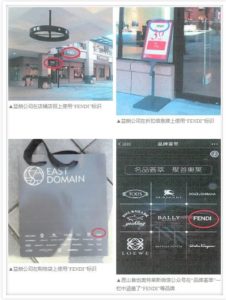Retail Scanner
Fendi v Shanghai Yi Lang International Co
November 2021
For many years, the China Trademark Office (CTMO) has not accepted “retail” services in Class 35, on the basis that the protection of services implies providing a service for others, rather than the sale of a brand owner’s own goods.
In recent years, there has been a degree of relaxation of this practice – especially when retail services in Class 35 are filed through the International System or when such services relate to medical, pharmaceutical or veterinary products.
The Chinese courts are recognising that the exclusion of retail services from trade mark registration is commercially difficult and some decisions are determining confusion, although the position remains unpredictable. In Shenzhen Milan Station Trading Co v Milan Station (Hong Kong) Holdings Limited: the court held that “retail services” fell within the scope of “sales promotions (for others)”, and similar reasoning was used to determine that retail supermarket services were similar to “sales promotions (for others)” (TingChao (Cayman Islands (Holdings) Co. Ltd v Min Fen.).
Fendi have experienced the unpredictability of the Chinese courts without protection for “retail services” in a long-drawn-out battle with a parallel importer, Shanghai Yi Lang International Co. Ltd (“Yi Lang”). Yi Lang operated a Fendi outlet store using parallel imported Fendi goods from France and used the “FENDI” trade marks on the signboard as well as on shopping bags, advertising brochures and their official WeChat account.

At first instance, at a local district-level court, it was held that there was no infringement, although this was reversed at second instance by the Shanghai Intellectual Property Court, who ordered Yi Lang to pay RMB350,000 to Fendi in compensation. Yi Lang requested that the case was sent to the Shanghai High Court for retrial and final determination.
The Shanghai High Court held:
- Use of “FENDI” on a signboard constituted a similar service to those in Class 35 as there would be similarities, for example, in the purpose, content, subjects, and that the relevant public would believe there to be certain connections.
- The fair use test decided by the 1st and 2nd instance courts was reversed, stating that instead of confusion, the courts should assess cases on:
- whether the purpose is in good faith
- whether the method is reasonable
- whether the use fits the commercial customs with integrity
- in this instance, Yi Lang blurred the boundaries between the official brand stores and authorised outlet stores and as such, their use was not fair.
Yi Lang was ordered to immediately cease their infringing use and pay compensation to Fendi.
The decision is good news for brand owners and does show the shift in the practice in China towards the generally accepted practice adopted internationally and the more commercial requirements of brand owners. In addition, we can hope that the decision from the Shanghai High Court will be used in other pending cases in numerous courts and will result in more consistent decisions in the future.
The decision also suggests that a Class 35 registration, even if there is no mention of retail services, is a useful tool in assisting in cases of trade mark infringement in China.
Careful consideration needs to be given the scope of services in Class 35 applications in China, and it is good practice to include other services in Class 35 such as “provision of an on-line marketplace for buyers and sellers of goods and services”, “marketing” and “sales promotion for others”.
If seeking protection through the International system, the term “the bringing together, for the benefit of others, of a variety of goods (excluding the transport thereof)” has also been accepted by the CTMO.
It can also be useful to consider other routes, such as:
- filing in Class 16 to protect packaging and materials
- copyright registrations
- unfair competition
This article was prepared by HGF Trade Mark Director Claire Jones.






























